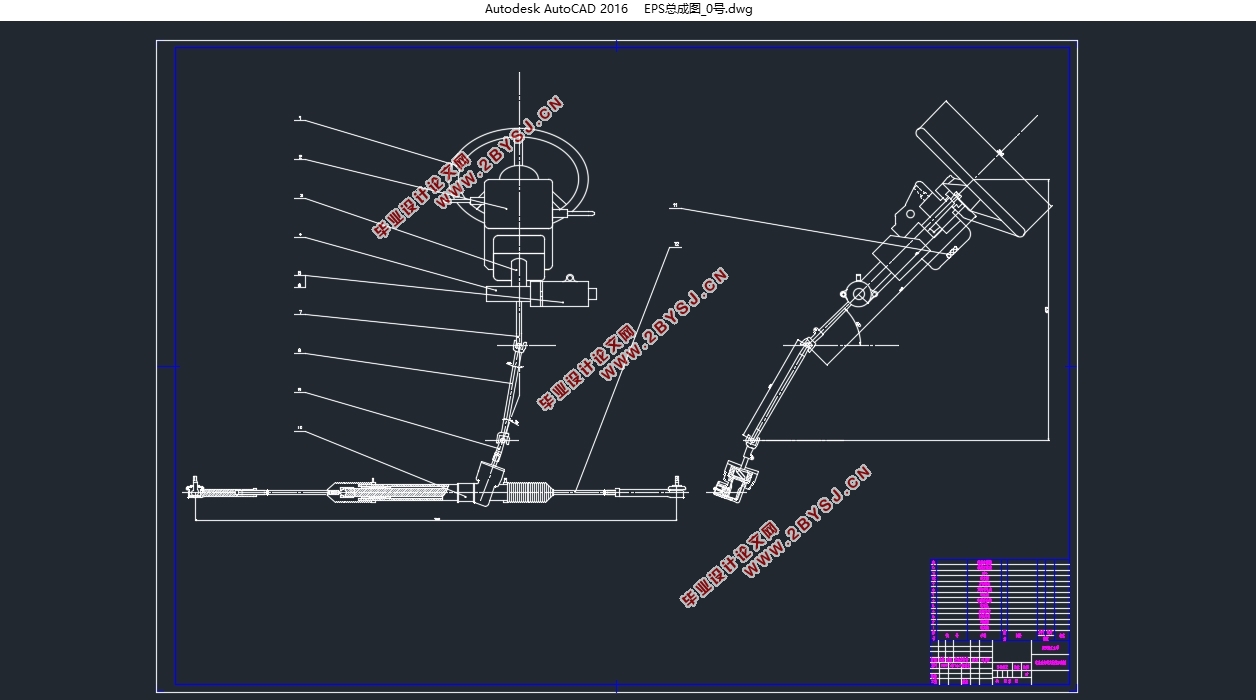普及型轿车转向系统设计(含CAD图)
无需注册登录,支付后按照提示操作即可获取该资料.
普及型轿车转向系统设计(含CAD图)(任务书,开题报告,外文翻译,文献摘要,论文说明书20000字,CAD图3张)
摘 要
随着经济的发展和路面状况的改善,人们对汽车高速行驶的稳定性要求越来越高。原有的机械系统无法解决这个问题,因而出现了助力转向系统。原有的电液助力转向系统体积大,能耗高。而电动助力转向系统在能改善操纵稳定性的同时具有体积小,效率高,绿色环保,装配简单等优点,它以成为汽车助力转向系统的一个重要发展方向。
本文在详细分析了电动助力转向的工作原理、结构及其特点,并展望了其发展趋势,阐述了国内外汽车电动助力转向的研究现状。然后,课题在对电动助力转向系统的组成部分和功能需求深入分析的基础上,根据电动助力转向系统的总体功能设计方案,对系统的各组成部件进行了选型和匹配,包括电动机、电磁离合器、扭矩传感器、车速传感器、以及减速器等。
最后,对电动助力转向系统的关键技术,助力特性和控制策略作了初步的研究。并最终设计出适合本设计燃料电池电动轿车的电动助力转向系统。
关键词:汽车 电动助力转向系统 减速机构 控制策略
Abstract
With the development of economy and the improvement of road condition, the quality of vehicle's high speed stability is becoming more and more serious. Traditional mechanical steering systems can't solve this problem, so power assistant steering systems have been developed. The existent Power Assistant Steering systems are low effective. Instead, the Electric Power Steering (EPS) has effective handling and stability in high speed and some other advantages. It has become a promising way in vehicle steering system.
In this thesis, we first analyze the present developing、intuition and prospect of EPS and the principle, structure. and characteristics of EPS are also discussed. Then based on the analysis of the function requirements of the system, the main components of the system were studied and matched including driving motor, electromagnetic clutch, torque sensor, vehicle speed sensor, and reducer.
At last, the key technique of EPS system the assist characteristic and control strategy are studied. And finally design a EPS system, which can meet with the need of the design – fuel cell electrical vehicle’s assisted steering system.
Key words: vehicle electric power steering system reduction gear control strategy
电机技术参数
型号 63ZL-1200 额定时间(ms) 2
额定电压(V) DC12 旋转方向 正反向
额定功率(W) 150 励磁方式 永久磁铁
额定扭矩(N.mm) 1200 外壳形式 全封闭
额定电流(A) 30 绝缘等级 B
转动惯量(g.m2) 0.18 最大电流(A) 35/10ms
额定转速(rpm) 1200 绝缘电阻 大于1MΩ


目录
Abstract 2
Key words: vehicle electric power steering system reduction gear control strategy 2
1. 绪论 3
1.1选题的目的及意义 3
1.3 电动助力转向系统的特点 5
1.4 国内外电动助力转向系统的研究与应用现状 6
1.5 论文的主要工作 7
2.2.1.1 电动机的功能 8
2.2.1.2 电动助力转向系统对电动机的要求 8
2.2.1.3 电动机的参数计算与选型 8
2.2.1.5 减速器减速比G的确定 11
2.2.2电磁离合器 11
2.2.2.1 电磁离合器的作用 11
2.2.2.2 电磁离合器的工作原理 12
2.2.2.3 电磁离合器的选型 12
2.3.3.2扭矩传感器的种类 12
2.2.4.2减速机构的选取 15
2.2.5 电子控制单元(ECU) 15
2.2.5.1 ECU的功能 15
2.2.5.2 ECU的结构组成 15
2.2.5.3 ECU的选型 16
2.2.6.1 转向器的作用 17
2.2.6.2 转向器设计时所需满足的设计要求 17
3 EPS关键部件—减速机构的设计计算 17
3.1.7.3. 时效处理 22
3.2.1轴的强度校核计算 23
3.2.2按扭转强度条件计算 24
4 关于EPS助力特性和控制策略的初步研究 25
4.1 助力特性分析 25
4. EPS系统匹配 28
4.1 助力特性的匹配 28
4.2 电动机的匹配 29
4.2.1 电动机布置位置选择 29
4.2.2 电动机特性参数的匹配 29
4.2.2.1 电动机输出力矩与前轴荷、减速机构、转向系传动比的匹配 29
4.2.2.2 电动机转速与转向盘转速的匹配 29
4.2.2.3 电动机尺寸形状与布置空间匹配 29
4.3 扭矩传感器的匹配 30
5.结论 30
